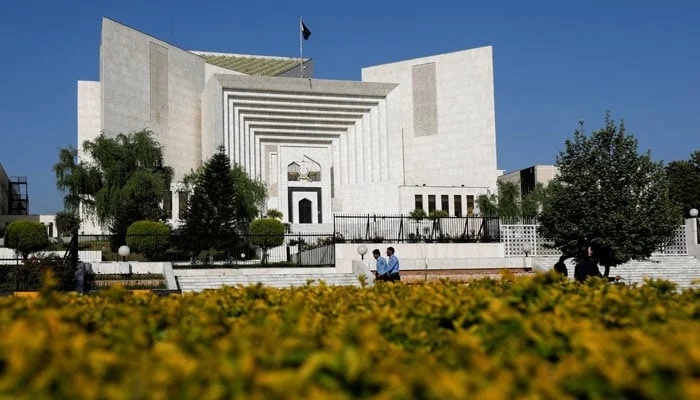ISLAMABAD: The Supreme Court will announce its verdict on the petitions challenging the Supreme Court (Review of Judgments and Orders) Act 2023 today (Friday) at 11am.
The top court verdict on these petitions is also important for former premier Nawaz Sharif and Istehkam-e-Pakistan Party (IPP) chief Jahangir Tareen as it will likely decide the fate of their electoral politics.
A three-member bench of the apex court headed by Chief Justice Umar Ata Bandial and comprising Justice Ijazul Ahsan and Justice Munib Akhtar had reserved its decision on June 19, saying: “We will announce the verdict after discussing it.”
Ghulam Mohiuddin, Zaman Khan Vardak, the Jurists Foundation, through its CEO Riaz Hanif Rahi, and the Pakistan Tehreek-e-Insaf (PTI) had challenged the vires of the act.
The apex court held six hearings — from June 7 to June 19 — on multiple petitions challenging the law, enacted in late May.
The top court had also clubbed the Election Commission of Pakistan’s (ECP) review petition against the Punjab election order with this matter since the two were directly linked.
The petitions were clubbed as the same three-member bench — under Article 184(3) — had issued the Punjab polls order and, under the new law, it could not hear the review plea.
Attorney General for Pakistan (AGP) Mansoor Usman Awan had asked the court to dismiss the pleas against the law, explaining that it broadens the court’s jurisdiction and does not curb its powers.
However, PTI lawyer Ali Zafar, on behalf of the party’s Secretary General Omar Ayub, had maintained that a change in the apex’s powers could not be made through legislation alone and required a constitutional amendment.
Nawaz, Jahangir’s return to electoral politics
Both Nawaz Sharif and Jahangir Tareen will be waiting for the verdict with bated breathes keeping in view their political ambitions amid upcoming general elections in the country following the completion of the tenure of the National Assembly.
Nawaz has been in self-imposed exile in London since November 2019 owing to health reasons.
He went to London in November 2019 for medical treatment after he was convicted by an accountability court in graft cases and he has been living there since then.
In 2016, Nawaz stepped down as the prime minister after the Supreme Court disqualified him for life for concealing assets.
Later, the PML-N supremo was convicted in the Al-Azizia and the Aveinfeild Apartment references filed by the National Accountability Bureau (NAB) which emerged in the aftermath of the Panama Papers leak.
Tareen on the other hand, was disqualified from electoral politics for life by the apex court on December 15, 2017 when a three-member bench led by the then-chief justice Mian Saqib Nisar found him guilty of being “dishonest” to the court.
Tareen, a former federal minister, and a former close aide of Khan, was declared disqualified under Article 62 of the Constitution — the same clause under which the three-time prime minister Nawaz Sharif was disqualified.
Tareen was also found guilty of concealing a London-based offshore company.
If the verdict today is not in favour of the petitions, and the bench decides to allow the law to come into effect, both Nawaz and Tareen are likely to make a comeback to politics as they will get an opportunity to challenge their disqualifications.
Prime Minister Shehbaz Sharif said on Thursday that his brother — Nawaz — would return to the country next month and face the law.
The review law
The law — passed during the coalition government’s tenure — aims to facilitate and strengthen the Supreme Court in exercising its powers to review its judgments and orders.
The statement of the objects and reasons of the law mentions that it is necessary to ensure fundamental rights to justice by providing for meaningful review of judgements and orders passed by the Supreme Court in the exercise of its original jurisdiction under Article 184.
In case of judgement and orders of the Supreme Court in the exercise of its original jurisdiction (suo motu powers) under Article 184 of the Constitution, the law states that the scope of review on both facts and the law shall be the same as an appeal under Article 185 of the Constitution.
Article 184(3) sets out the apex court’s original jurisdiction and enables it to assume jurisdiction of matters involving a question of “public importance” with reference to the “enforcement of any of the fundamental rights” of the citizens.
Earlier, a bench that had issued the original order heard the review petition, but under the review law, it can no longer do so.
“A review petition shall be heard by a bench larger than the bench which passed the original judgment in order. The review petitioner shall have the right to appoint any advocate of the Supreme Court of his choice for the review petition,” the law states.
It adds that the right to file a review petition shall also be available to an aggrieved person against whom an order was made under clause (3) of Article 184 of the Constitution, prior to the commencement of this act, provided that the review petition “be filed within sixty days of the commencement of this Act.”
“A review petition may be filed within sixty days of the passing of the original order,” it adds.



Comments are closed.